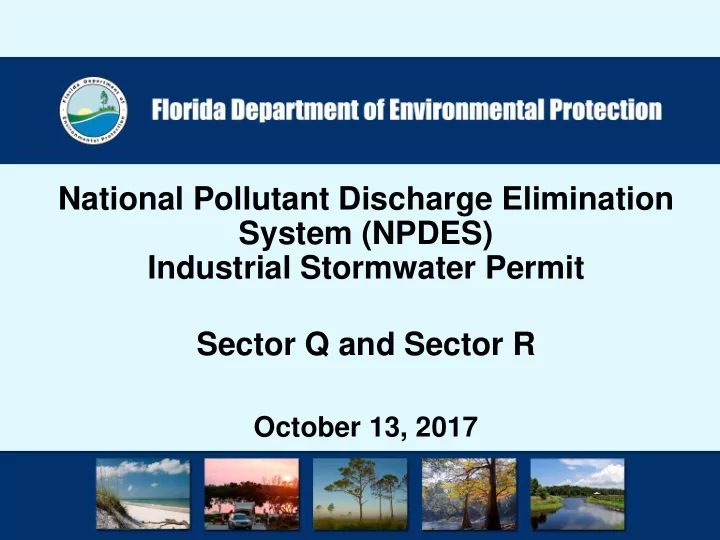

National Pollutant Discharge Elimination System (NPDES) Industrial Stormwater Permit Sector Q and Sector R October 13, 2017
NPDES Overview • Regulates point source discharges of stormwater into Florida’s surface waters: - Municipal separate stormwater system (MS4) - Industrial activities - Construction activities • Delegated by the U.S. Environmental Protection Agency (EPA) to the state in October of 2000. • Authority to oversee and administer is set forth in Section 403.0885, Florida Statutes (F.S.).
NPDES Overview DEP is responsible for: • Promulgating rules (Tallahassee) • Issuing permits (Tallahassee) • Managing and reviewing permit applications (Tallahassee) • Compliance and enforcement activities (District Office)
Multi-Sector Generic Permit (MSGP) Who needs an MSGP? • Facilities which conduct one or more regulated “industrial activities” as defined in 40 CFR 122.26(b)(14) • Regulated industrial activities divided up into sectors, and • Discharge stormwater associated with those regulated “industrial activities” to surface waters of the State or to an Municipal separate stormwater system (MS4) .
Regulated Industrial Activities Sector A: Timber Products Sector P: Land Transportation Sector B: Paper Products Sector Q: Water Transportation Sector R: Ship & Boat Building Manufacturing Sector C: Chemical Manufacturing Sector S: Air Transportation Sector D: Asphalt Paving Sector T: Treatment Works Sector E: Glass, Clay, Cement, Man. Sector U: Food & Kindred Products Sector F: Primary Metals Sector V: Textile Mills Sector G: Metal Mining Sector W: Furniture & Fixtures Sector H: Coal Mines Sector X: Printing & Publishing Sector I: Oil and Gas Extraction Sector Y: Plastics Manufacturing Sector J: Mineral Mining & Dressing Sector Z: Leather Tanning & Finishing Sector K: Hazardous Waste Facilities Sector AA: Fabricated Metal Products Sector L: Landfills Sector AB: Transportation Equip. Sector M: Auto Salvage Yards Sector AC: Electronic Goods Sector N: Recycling Facilities Sector AD: Additional Activities Sector O: Power Plants (Steam)
Multi Sector Generic Permit • Evaluate site for no exposure. • Develop a Stormwater Pollution Prevention Plan (SWPPP). Update SWPPP as necessary. • Implement proper best management practices (BMPs). • Submit Notice of Intent (NOI) and fee timely. • Inspect site and conduct monitoring. • Meet water quality standards.
No Exposure Certification (NEX) • Available for industrial facilities whose processes and materials are not exposed to stormwater or stormwater contact. • Applicable to all categories. • Information can be found at: • http://www.dep.state.fl.us/water/stormwater/np des/industrial3.htm
Development of a SWPPP • DEP/EPA Guidance on Development of SWPPP: http://www.dep.state.fl.us/water/stormwater/ npdes/guidance_links.htm • Update routinely. • SWPPP requirements are located in the fact sheet and permit language sections. • Sample SWPPP Template for Marinas http://www.dep.state.fl.us/cleanmarina/files/ Sample_Stormwater_P2_Plan.pdf
Implementing BMP’s • Sector Q – Table Q-1 Industrial Activities, Pollutant Sources and Pollutants Provides the activity of concern, where the pollutant would come from, and description of pollutant associated with activity. Industrial Activity Pollutant Source Pollutant Pressure Washing Wash Water Paint solids, heavy metals, TSS Table Q-3 – Industrial Activities and Potential Best Management Practices (BMPs) Industrial Activity BMPs Pressure Washing Collect discharge water and remove all visible solids before discharging to a sewer system, or where permitted, to a drainage system, or receiving water. Etc…
Implementing BMP’s Sector Q/R Industrial Activities • Pressure washing • Surface preparation, paint removal, sanding • Painting • Drydock maintenance • Drydocking/drydock activities • Non-dry dock containment • Engine maintenance and repairs • Material handling: bulk liquid storage and containment • Material handling: containerized material storage • Designated material mixing areas • Shipboard processes: improperly discharged to storm sewer or into receiving water • Bilge and ballast water
Applying For Your Permit • DEP Portal: http://www.fldepportal.com/go/ - Applicants will fill in their information, get a PIN number, and pay the application fee. - Plan ahead if new to the DEP Portal. • Paper applications can be found at: http://www.dep.state.fl.us/water/stormwater/npdes/forms/MSGP- NOI.pdf • Submit the completed application and fee to: http://www.dep.state.fl.us/water/stormwater/npdes/contacts.htm • An acknowledgement letter will be issued once complete application and fee are received/processed. • Fee for permit coverage for an MSGP permit is $500 and is good for five years. • Fee for coverage for an NEX facility is $200 and is valid for five years.
Monitoring Sector Q- marinas Sector R- ship/boat building • Analytical monitoring requirements: • Aluminum, iron, lead, and zinc • No analytical monitoring required. • Benchmark levels • Quarterly visual monitoring • 2 nd and 4 th year of permit cycle • Observations outlined in sampling requirements permit • 4 th year sampling can be • Taken out outfall locations conditional • Even if no qualifying events • Reporting requirements monitoring is still required. • Sample type • Representative discharge • Quarterly visual monitoring • Observations outlined in permit • Taken out outfall locations • Even if no qualifying events monitoring is still required.
Other Requirements • Conduct monthly inspections. • Annual employee training. • Document spills and/or other discharges. • Identify non-stormwater discharges. • Example: routine washing activities. • Closed loop recycle systems. • Comprehensive site compliance evaluation annually.
Contact Information Florida Department of Environmental Protection NPDES Stormwater Permitting Program, Tallahassee 850-245-7522 NPDES-stormwater@dep.state.fl.us Borja Crane-Amores, Borja.CraneAmores@dep.state.fl.us Cierra Robinson, Cierra.Robinson@dep.state.fl.us
Compliance Inspections • Permit Active • SWPPP on Hand, Complete, and Implemented • BMPs on Hand, Complete, and Implemented • Analytical and Compliance Monitoring Requirements • Facility Site Review • Condition of Receiving Waters
Compliance Inspections
Compliance Inspections
Compliance Inspections
Compliance Inspections
Compliance Inspections
Compliance Inspections
Compliance Inspections
Compliance Inspections
Questions?
Contact Information Compliance Assurance Program Panama City Michael Fuller (EA), 850-767-0040 michael.fuller@dep.state.fl.us Lucas Grantham 850-767-0041, lucas.grantahm@dep.state.fl.us Corinna Clanton, 850-767-0046, corinna.clanton@dep.state.fl.us Mark Sumner, 850-767-0052, mark.sumner@dep.state.fl.us Tallahassee Amanda Lanphere 850-245-7627, amanda.lanphere@dep.state.fl.us Heather Perkins 850-245-7626, heather.perkins@dep.state.fl.us
Recommend
More recommend